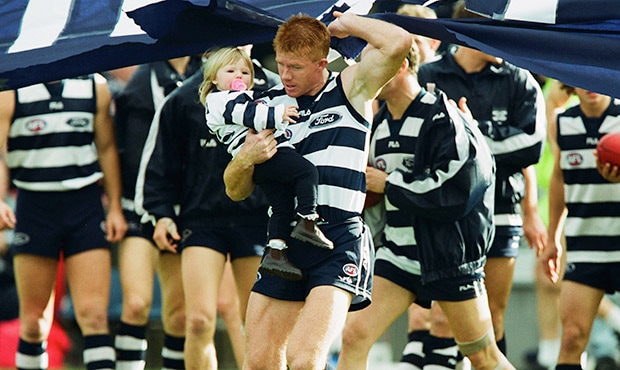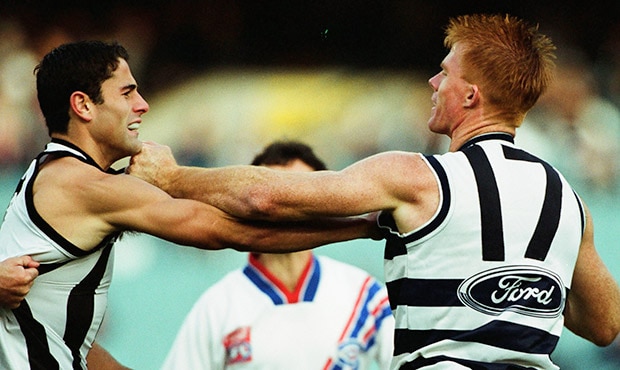WHEN former North Melbourne and Geelong defender Tim McGrath was diagnosed with cancer around six months ago, he initially approached his illness as being nothing more than a bit of an inconvenience.
"I was thinking, 'I'll have six or eight weeks of intense treatment and then away we go. Everyone's happy.' But I didn't realise the stage that the cancer was at," the 43-year-old told AFL.com.au.
It wasn't until McGrath visited his oncologist, who just happens to be a passionate Cats fan, that the true severity of his situation hit home.
"He told me the cancer was stage three," McGrath recalled.
"I said, 'Fair enough. No worries. Ah, how many stages are there?' He looked at me and said, 'Four.' Then he told me I'd need 12 months of treatment. I nearly fell off my chair.
"My wife was sitting next to me and she grabbed me on the arm. It was pretty emotional. We ended up going through the whole scenario with the oncologist and discussing things with him for an hour and a half. That's when it became clear why I was going to need 12 months of treatment."
More Saturday spotlights
McGrath's problem was a melanoma that had developed in a lymph node under his right arm. Once the lump was diagnosed as cancerous, he underwent a major operation to try and rid his body of the damaged tissue.
"They took out 33 lymph nodes, and 32 of the 33 were okay," he explained. "There was one that was the problem. It was about six centimetres by four centimetres, so it was pretty big. The cancer was confined to that one, but post that operation I had another little one problem, so I had to get another one taken out."
In late July, McGrath started receiving treatment at the St John of God hospital in Geelong. His initial doses of chemotherapy were administered via a Hickman's catheter that was inserted into his chest.
"That was the intensive part," he said. "Some days I'd have the shakes for five or six hours and I couldn't stop it. It was full-on. After the first week I felt like I'd been hit by a bus and then it had reversed back over me."
In no shape to work, the father of three girls wound up his construction business, Blue Sky Homes, which placed his family under financial pressure.
"My wife only worked part-time at a local bakery as a pastry chef," McGrath said. "We had to have a discussion about her going to work full-time. She spoke to her boss about giving her more hours, and they were great."
It wasn't long before plenty more offers of help flooded in. The man known as 'Bluey', due to his shock of red hair, is a much-loved character in Geelong, thanks to his perennially upbeat personality and his deeds on the footy field for the Cats.
An ultra-competitive backman, McGrath started his AFL career at North Melbourne but made his name at Geelong, where he played 219 games between 1992 and 2002, a period that included losing Grand Finals in 1992, '94 and '95.

McGrath breaks through the Geelong banner with his daughter for game 200. Picture: AFL Media
McGrath's popularity has undoubtedly contributed to the way the Geelong community has rallied around him. The local clubs (Grovedale and Geelong Amateur) where his daughters play netball led the way, while the Cats' past players group recently held a fundraising function, titled 'A Night for Bluey', in the Fred Flanagan room at Simonds Stadium. Around 400 people paid $150 to attend hear yarns spun by the likes of Dermott Brereton and Andrew Bews.
The largest fundraising effort has been a joint project to support McGrath and former Geelong VFL player Casey Tutungi, who was left a quadriplegic after an on-field accident in a local footy match earlier this year.
A host of local businesses, led by Urbanedge Homes, Shojun Concrete and Gartland Real Estate, have helped construct a four bedroom home in the new Warralily Coast Estate. The proceeds from the auction of the home will be split evenly between the pair.
Initially, McGrath struggled to accept the support. "I was thinking, 'I don't want this.' Everyone's got an ego, of course. I was saying to my mates, 'This is a bit embarrassing.' But Ben Casanelia, who I do some footy calling with at K-Rock radio, said to me, 'You're not going to be working for 12 months. And what you've got could potentially kill you. You've got to let people help you.'
"I hadn't thought of it like that. But as the doctor said, there are no guarantees, whether you like it or not, that the treatment will work. After that I changed my tune a little bit. I realised that people just wanted to help me because they're fantastic people. So I've put my ego aside and recognised that the support is great. After all, if it was your next door neighbour or whatever, you'd do the same thing."

McGrath comes to blows with Collingwood's Paul Licuria. Picture: AFL Media
Having had the catheter removed some weeks ago, McGrath's treatment now consists of injections three times per week. He has had some recent dramas with his blood tests, which have shown some concerning fluctuations in his white blood cell count. However, his condition has improved to the point where he has been able to help out one of his mates, who is building a house in the seaside town of Anglesea.
"It gets me out of the house and gets my mind ticking over," he said. "Initially, I couldn't concentrate for more than 10 minutes. They call it chemo brain. I'd look at some plans while I was getting my treatment, but I couldn't focus on it. Now I'm okay."
McGrath has set his sights on becoming a player welfare manager at an AFL club when he regains his health. With that in mind, he has enrolled in a number of education programs offered by the AFL Coaches' Association. Still, he readily admits that his long-term prognosis remains unclear.
"I'm probably not going to know exactly how I'm tracking until January or February when I have another scan and find out whether any cancer has come back or not," he said.
"The hard bit is when I'm on my own – the kids are at school, the wife's at work. You start thinking different things. But the doctors have encouraged me to be really upfront about how I'm feeling. And I've found that talking about what I'm going through is the best thing."
"The girls don't want to come home from school and see me on the couch with the sads on. You've just got to be as positive as you can. It's not everyone's cup of tea, but it's the way I've been for ever and a day."
SIX POINTERS WITH TIM McGRATH
What do you like most about the game?
Being involved in it. I played in three Grand Finals and lost them all, but the opportunity to get there was worth it. I look back on my whole career as a great learning experience.
What don't you like?
To be honest, I love most things about the game.
What would you change about the game?
I think defenders should still be able to chop the forwards' arms. Otherwise they've got no hope. Playing on Carey and Dunstall and these blokes, I'd have had no hope of stopping them if I couldn't chop their arms.
Favourite player and why?
I follow Geelong pretty closely, so I'm a big fan of blokes like Joel Selwood and Harry Taylor. It was a great thing for the club when Harry signed up for another five years.
How many operations have you had?
Not many. I had a pretty good run. The last year I had at Geelong, when I just played in the VFL, I had an ankle problem that turned out to be a large cyst growing on my Achilles. I had that operated on and missed nine games, then came back and broke my wrist playing in the Geelong league with Grovedale during a VFL bye.
How will your former clubs North Melbourne and Geelong go next year?
I think all those games the Kangaroos lost this year by small margins will actually hold them in good stead next year. It should make them tougher mentally. I think they can make the top four next year.
I suppose it's a bit of a changing of the guard at Geelong. It's probably hard for the supporters to fathom that Pods, Chappy and Josh Hunt have gone, but that's the way it is. I think the young kids they've got are as good as any in the competition. And they need games, so it could be a very exciting season for the Cats next year.
Twitter: @AFL_AdamMcNicol

